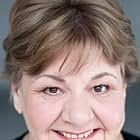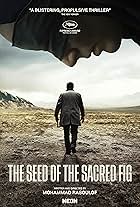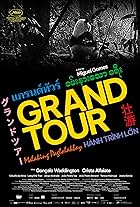An absurdist triptych of seemingly unconnected stories find a mysterious point of intersection in this tale set somewhere between Winnipeg and Tehran.An absurdist triptych of seemingly unconnected stories find a mysterious point of intersection in this tale set somewhere between Winnipeg and Tehran.An absurdist triptych of seemingly unconnected stories find a mysterious point of intersection in this tale set somewhere between Winnipeg and Tehran.
- Awards
- 16 wins & 13 nominations total
- Director
- Writers
- All cast & crew
- Production, box office & more at IMDbPro
Storyline
Did you know
- TriviaOfficial submission of Canada for the 'Best International Feature Film' category of the 97th Academy Awards in 2025.
- SoundtracksThese Eyes
Written by Randy Bachman and Burton Cummings
Performed by The Guess Who
Featured review
What happens when you take the cultural traditions of two seemingly distant worlds and fuse them into a chaotically harmonious mosaic? In "Universal Language", Matthew Rankin crafts a story that's both absurdly specific and oddly universal, examining Canadian identity through the lens of a deeply personal reimagining. The result is an ode to multiculturalism, brimming with ironic humor, cultural parodies, and a warm humanity that transcends linguistic boundaries.
From the start, Rankin plunges us into an alternate Canada where Farsi and French are the official languages. This choice might seem random at first, but it's actually a meticulous effort to subvert traditional narratives of Canadian identity. The visual humor-like a Winnipeg school sign written in Persian script-sets the film's quirky tone, blending magical realism with deadpan comedy. Professor Bilodeau, played with biting wit by Mani Soleymanlou, becomes both a symbol of everyday exasperation and a tragicomic figure embodying the tensions between cultural tradition and innovation.
The journey of sisters Negin (Rojina Esmaeili) and Nazgol (Saba Vahedyousefi) captures Rankin's vision of childhood as a realm of improbable discoveries and absurd adventures. When they find a frozen banknote stuck in ice, their innocent desire to free it morphs into a mission that takes them through brutalist neighborhoods with monochromatic names. This icy, concrete setting deliciously contrasts with the cultural vibrancy brought to life by the sisters' Farsi dialogue and boundless energy. Their quest isn't just about retrieving a piece of money-it's a metaphor for perseverance and the search for meaning in an often indifferent world.
In a parallel narrative, Rankin inserts himself as a fictionalized version of himself, delivering a storyline that's equal parts comedic and introspective. His journey to visit his ailing mother in Manitoba highlights the peculiarities of Canadian life: a live turkey with its own seat on the bus, banal monuments celebrated as historical landmarks. This balance between the mundane and the surreal is where the film truly shines, transforming small, everyday details into sharp commentary on national identity, collective memory, and the bonds that connect us.
Rankin's cinematic influences are both obvious and masterfully employed. Winnipeg's aesthetic recalls the work of Guy Maddin, while the bizarre scenarios evoke Roy Andersson's humor. Yet at its heart, the film pulses with the sensitivity of Abbas Kiarostami. The classroom scenes, blending humor with a touch of melancholy, are a direct homage to Iranian cinema, adding a layer of universality that transcends geography. This cultural connection isn't a superficial gimmick but is deeply woven into the narrative, reflecting Rankin's genuine effort to explore what it means to belong in a constantly shifting world.
Even in its lightheartedness, "Universal Language" delivers a sharp critique of identity and cultural integration. By reimagining Canada as a space shared between two cultures, the film challenges xenophobia and isolation, offering a vision where differences are celebrated rather than erased. There's also a playful provocation in the film's visual and narrative choices, like Tim Hortons signs written in Farsi or pharmacies embracing the exaggerated minimalism of the No Name brand. These local jokes might not land as strongly with international audiences, but they add layers of authenticity for those familiar with Canadian cultural symbols.
What truly elevates "Universal Language", though, is its ability to balance absurdity with empathy. No matter how eccentric the situations get-whether it's Turks navigating the city or reenactments of 1950s parking lot incidents-the film never loses sight of its characters' humanity. The third act's role-swapping among actors reinforces the idea that, despite cultural or linguistic differences, we share a common essence.
In the end, Rankin delivers more than a film-he offers a cinematic experience that challenges conventions while celebrating life's complexity. "Universal Language" isn't just a cultural satire or a surreal homage; it's a reminder that, even in a fragmented world, there's still room for connection, understanding, and, of course, a little bit of madness.
From the start, Rankin plunges us into an alternate Canada where Farsi and French are the official languages. This choice might seem random at first, but it's actually a meticulous effort to subvert traditional narratives of Canadian identity. The visual humor-like a Winnipeg school sign written in Persian script-sets the film's quirky tone, blending magical realism with deadpan comedy. Professor Bilodeau, played with biting wit by Mani Soleymanlou, becomes both a symbol of everyday exasperation and a tragicomic figure embodying the tensions between cultural tradition and innovation.
The journey of sisters Negin (Rojina Esmaeili) and Nazgol (Saba Vahedyousefi) captures Rankin's vision of childhood as a realm of improbable discoveries and absurd adventures. When they find a frozen banknote stuck in ice, their innocent desire to free it morphs into a mission that takes them through brutalist neighborhoods with monochromatic names. This icy, concrete setting deliciously contrasts with the cultural vibrancy brought to life by the sisters' Farsi dialogue and boundless energy. Their quest isn't just about retrieving a piece of money-it's a metaphor for perseverance and the search for meaning in an often indifferent world.
In a parallel narrative, Rankin inserts himself as a fictionalized version of himself, delivering a storyline that's equal parts comedic and introspective. His journey to visit his ailing mother in Manitoba highlights the peculiarities of Canadian life: a live turkey with its own seat on the bus, banal monuments celebrated as historical landmarks. This balance between the mundane and the surreal is where the film truly shines, transforming small, everyday details into sharp commentary on national identity, collective memory, and the bonds that connect us.
Rankin's cinematic influences are both obvious and masterfully employed. Winnipeg's aesthetic recalls the work of Guy Maddin, while the bizarre scenarios evoke Roy Andersson's humor. Yet at its heart, the film pulses with the sensitivity of Abbas Kiarostami. The classroom scenes, blending humor with a touch of melancholy, are a direct homage to Iranian cinema, adding a layer of universality that transcends geography. This cultural connection isn't a superficial gimmick but is deeply woven into the narrative, reflecting Rankin's genuine effort to explore what it means to belong in a constantly shifting world.
Even in its lightheartedness, "Universal Language" delivers a sharp critique of identity and cultural integration. By reimagining Canada as a space shared between two cultures, the film challenges xenophobia and isolation, offering a vision where differences are celebrated rather than erased. There's also a playful provocation in the film's visual and narrative choices, like Tim Hortons signs written in Farsi or pharmacies embracing the exaggerated minimalism of the No Name brand. These local jokes might not land as strongly with international audiences, but they add layers of authenticity for those familiar with Canadian cultural symbols.
What truly elevates "Universal Language", though, is its ability to balance absurdity with empathy. No matter how eccentric the situations get-whether it's Turks navigating the city or reenactments of 1950s parking lot incidents-the film never loses sight of its characters' humanity. The third act's role-swapping among actors reinforces the idea that, despite cultural or linguistic differences, we share a common essence.
In the end, Rankin delivers more than a film-he offers a cinematic experience that challenges conventions while celebrating life's complexity. "Universal Language" isn't just a cultural satire or a surreal homage; it's a reminder that, even in a fragmented world, there's still room for connection, understanding, and, of course, a little bit of madness.
Details
- Release date
- Country of origin
- Official site
- Languages
- Also known as
- 大同世界
- Production company
- See more company credits at IMDbPro
Box office
- Gross US & Canada
- $4,550
- Gross worldwide
- $4,550
- Runtime1 hour 29 minutes
- Color
- Aspect ratio
- 1.66 : 1
Contribute to this page
Suggest an edit or add missing content


























